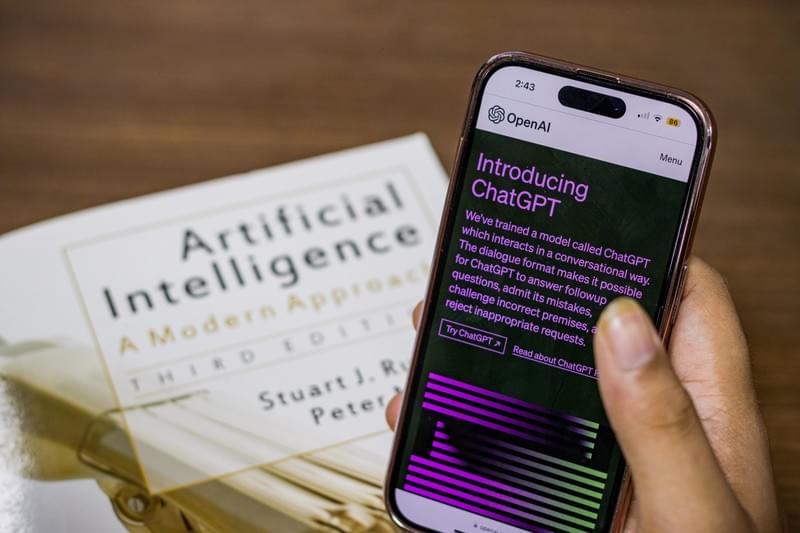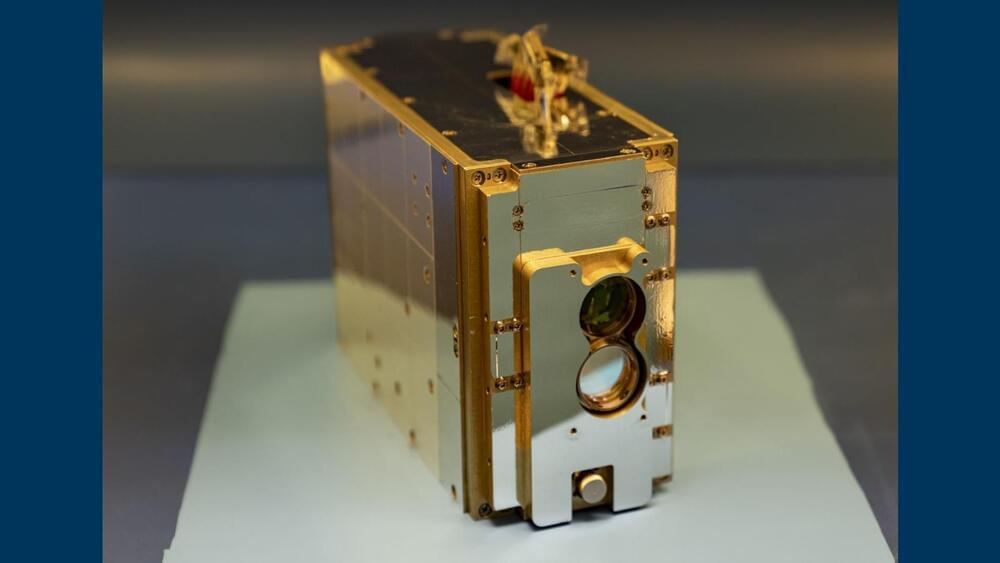Jun 12, 2023
Can AI actually increase human productivity?
Posted by Shubham Ghosh Roy in category: robotics/AI
Explore how artificial intelligence (AI) is revolutionizing industries, unleashing transformative potential, and supercharging efficiency.

Explore how artificial intelligence (AI) is revolutionizing industries, unleashing transformative potential, and supercharging efficiency.
From gene expression to protein design, large language models are creating a suite of powerful genomic tools for DNA analysis.

NASA and a team of partners has demonstrated a space-to-ground laser communication system operating at a record breaking 200 gigabit per second (Gbps) data rate. The TeraByte InfraRed Delivery (TBIRD) satellite payload was designed and built by[MIT Lincoln Laboratory]. The record of the highest data rate ever achieved by a space-to-Earth optical communication link surpasses the 100 Gbps record set by the same team in June 2022.
[NASA] and a team of partners has demonstrated a space-to-ground laser communication system operating at a record breaking 200 gigabit per second (Gbps) data rate. The TeraByte InfraRed Delivery (TBIRD) satellite payload was designed and built by [MIT Lincoln Laboratory]. The record of the highest data rate ever achieved by a space-to-Earth optical communication link surpasses the 100 Gbps record set by the same team in June 2022.
Continue reading “NASA Team Sets New Space-to-Ground Laser Communication Record” »
When interacting with another person, you likely spend part of your time trying to anticipate how they will feel about what you’re saying or doing. This task requires a cognitive skill called theory of mind, which helps us to infer other people’s beliefs, desires, intentions, and emotions.
MIT neuroscientists have now designed a computational model that can predict other people’s emotions—including joy, gratitude, confusion, regret, and embarrassment—approximating human observers’ social intelligence. The model was designed to predict the emotions of people involved in a situation based on the prisoner’s dilemma, a classic game theory scenario in which two people must decide whether to cooperate with their partner or betray them.
To build the model, the researchers incorporated several factors that have been hypothesized to influence people’s emotional reactions, including that person’s desires, their expectations in a particular situation, and whether anyone was watching their actions.
A unique use case for AI is around enhanced transaction monitoring to help combat financial fraud. Traditional rule-based approaches to anti-money laundering (AML) use static thresholds that only capture one element of a transaction, meaning they deliver a high rate of false positives. Not only is this hugely inefficient, but it can also be very demotivating for staff. With AI, multiple factors can be reviewed simultaneously to extract a risk score and develop an intelligent understanding of what risky behavior looks like. A feedback loop based on advanced analytics means that the more data is collected, the more intelligent the solution becomes. Pinpointing financial crime becomes more efficient and employees also benefit from more free time to focus efforts on other areas of importance like strategy and business development.
Thanks to its ever-increasing applications to evolving business challenges, regulators and financial institutions can no longer turn a blind eye to the potential of AI, with the power to revolutionize the financial system. It presents unique opportunities to reduce the capacity for human error, costing highly regulated industries billions each year.
What’s clear is that some technologies will, over time, become too difficult to ignore. As we saw with the adoption of the cloud, failure to embrace innovative technologies means organizations will get left behind. The cloud was once a pipedream, but now it’s a crucial part of all business operations today. Businesses implemented (or are in the process of implementing) huge digital transformation projects to migrate business processes to the cloud. Similarly, new organizations will kickstart their businesses in the cloud. This is a lesson that technologists must remain alert and continue to keep their finger on the pulse when it comes to incorporating fresh solutions.

One month into living under Russian occupation in northern Ukraine, Marina cycled cautiously through her village. She was five doors from her elderly parents’ blue garden gate when three soldiers ordered her to stop. Grabbing her hair, they dragged Marina into a neighbour’s empty house.
“They forced me to strip naked,” the 47-year-old said, picking at the skin around her fingernails. “I asked them not to touch me, but they said: ‘Your Ukrainian soldiers are killing us’.”
Billionaire investor Li Ka-Shing is funding a new technology that can potentially rival artificial intelligence (AI) by using brain cells blended with computers in a technology it calls DishBrain.
Peter Thiel, Mark Cuban and Warren Buffet funded early-stage startups and made millions. You don’t need to be a well-connected billionaire to do the same. Click here to invest in promising startups today.
This science fiction-sounding tech comes from Australian biotech firm Cortical Labs. The company recently raised $10 million in a round led by Horizons Ventures, the investment vehicle of the 94-year-old Ka-Shing, the richest person in Hong Kong. Additional investors included Blackbird Ventures, an Australian venture capital (VC) fund; In-Q-Tel, the investment arm of the Central Intelligence Agency; U.S. firm LifeX Ventures; and others.
The brightest gamma-ray explosion ever caught on record, which was so bright it blinded scientific instruments, just got weirder.
GRB 221,009, first spotted in October 2022, outshone other cosmic explosions on record by “not just a little bit, but a hundred times,” George Washington University graduate student Brendan O’Connor said in a press release.
The explosion earned the nickname BOAT for “Brightest of All Time.”

Caregivers of individuals with cancer likely have concerns about employment rights, finances, and support. This video will provide some options to support cancer caregivers.
Today Loremasters we explore some of hyper technology of the Necrons – the World Engine, Celestial Orrery & the Dolmen Gates.
Masters of Material Technology
The Necrons are the masters of Material technology, and their technological feats may seem magical to lesser races. Their technological masters, Crypteks, can manipulate matter at a fundamental level and wield such arcane concepts as phase-gates, subatomic infusion, and temporal looping. Several Necron super-weapons such as the World Engine and Celestial Orrery have galaxy-devastating capabilities. However it is Living Metal, or Necrodermis, which equips nearly all Necron technology. These billion-strong swarns of nano–Scarabs crawl under the skin of Necrons at a cellular level, allowing for self-repair and regeneration. Also, on particularly rare occasions, a super heavy Necron device called a Necron Pylon is seen. It is feared for its extreme power and ability to appear anywhere on the battlefield.
